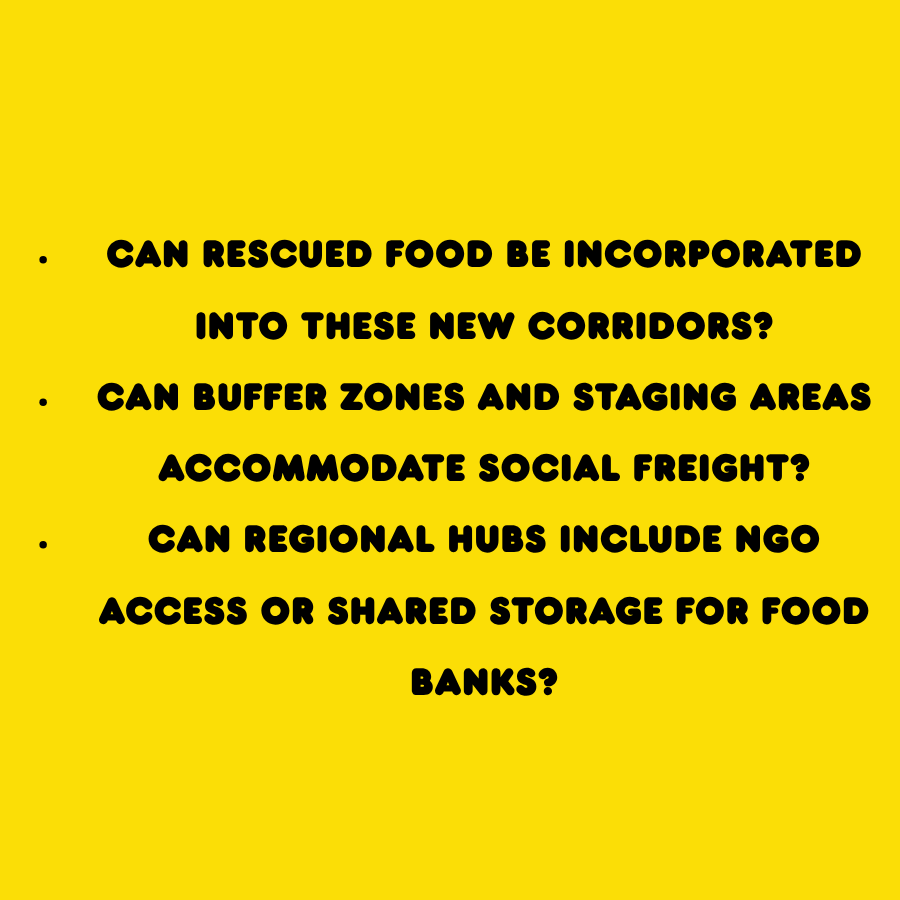As delegates gathered for the 2025 Road Freight Association (RFA) Convention, it was clear that the logistics sector is entering a bold new era: one of innovation, recalibration, and structural reform. From rail revitalisation and regional trade corridors to automation, security, and the future of intermodal freight villages, the message was unmistakable: this industry is not standing still.
SA Harvest team members attended the Convention with deep curiosity and left with deep respect. We’re not freight operators in the traditional sense. But we are part of the same supply chain ecosystem. And more importantly, we are part of the same solution space.
Where others measure success in tonnes moved or turnaround time, our metric is different: meals delivered, lives nourished, dignity restored. Yet none of that happens without trucks, cold chains, cross-docking hubs, and the logistics professionals who keep South Africa moving.
The RFA: Partners Who Believed from the Beginning
Before any pallets were loaded or empty legs offered, it began with belief. The belief that logistics could do more than move goods; it could move impact. The Road Freight Association was the first industry body to truly understand and support our vision, recognising that solving hunger in South Africa required cross-sector collaboration and logistical innovation.
RFA didn’t just open doors, they opened minds. Their endorsement helped catalyse partnerships and conversations that are now evolving into sustainable logistics solutions with real social impact.
Rethinking Freight as a Force for Good
The Convention was rich with data and insight. From the sobering drop in Transnet’s rail volumes to the pragmatic optimism around third-party access and the rise of freight villages. It was also deeply pragmatic: acknowledging crime, congestion, and infrastructure fatigue, while celebrating the grit that defines this industry.
But amid the spreadsheets and strategy decks, there was something else, a quiet undercurrent of purpose. In hallway conversations, on-stage remarks, and even sponsor showcases, we sensed a shift: a willingness to explore how logistics can not only drive economic recovery, but also enable social transformation.
And that’s where we see powerful synergy between SA Harvest and the freight sector.
Empty Legs, Full Plates
Thanks to the foresight of some of our logistics partners, we’re already making it happen. Through collaboration with transport operators, we’re leveraging empty legs (those return trips with no cargo) to move rescued food to community-based organisations across the country. It’s smart logistics. It’s cost-neutral. And it’s legally beneficial: we issue Section 18A tax certificates for the value of the donation-in-kind.
The impact? Thousands of kilograms of edible food, which might otherwise go to landfill, redirected to soup kitchens, shelters, and feeding programmes. This isn’t a corporate social responsibility campaign. It’s logistics with purpose. It’s a model for how freight can deliver more than just goods, it can deliver hope.
The Road Ahead: Joining Forces in the Transition
With structural reforms underway, particularly the ambitious rail roadmap and vertical separation of infrastructure management, there is a real opportunity for inclusive logistics planning.
As we pivot towards intermodalism and freight villages, we urge policymakers and private operators to consider:

Just as the RFA has championed “Rail must carry its fair share,” we ask: Can logistics carry its fair weight in solving hunger too? The answer, from what we witnessed at the Convention, is yes.
We saw a sector eager to innovate, to partner, and to lead with integrity. As one presenter put it: “Each mode must find its rightful place in the value chain.” We believe this extends beyond mode, but to purpose.
Final Thought: From Load to Legacy
The African Continental Free Trade Agreement (AfCFTA), discussed during the conference, opens vast opportunity, but also challenges. Efficient movement of goods across borders cannot just be a commercial priority. It must be a humanitarian one too. Food security, regional hunger, and supply chain resilience are intimately connected.
Let’s not wait for another crisis to bring us to the table together.
Let’s institutionalise the partnerships now, between freight and food rescue, between logistics and community, between strategy and humanity.
Together, we can transform dead mileage into living impact.